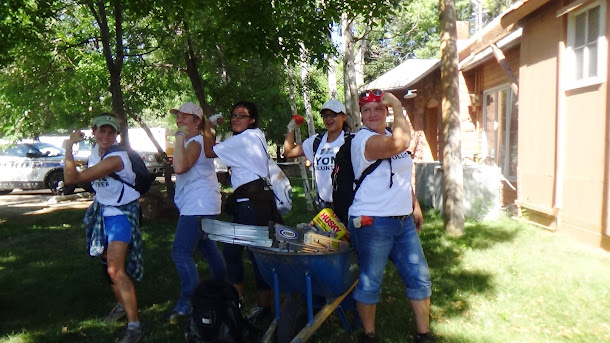A group of high school students, college interns, and Sustainable Development Institute staff traveled to Colorado to learn about water and fire issues, climate change’s impacts on the ecology of the region, and what sustainability means in different places as part of the USDA POSOH project. While camping out in the mountains for 5 days, the group received an eye-opening overview of the landscape through tours and hiking, while also working on service-learning projects in areas recently impacted by major floods and fires.
Before going out to rough it in the mountains, the program began at The Alliance Center in Denver, CO, the hub for sustainability in Colorado, to hear from local sustainability experts and learn more about increased fire load and intensity as well as drought and flood issues facing Colorado.
Kristin Maharg, Program Manager, for the Colorado Foundation for Water Education called Colorado the land of extremes and described some of the challenges and opportunities with the scarce resource in the west–water. “Colorado, being at the headwaters of many major watersheds in the west, is a water steward for many states out here, as well as Mexico. We are trying to move from a capitalistic view of water to a more collaborative perspective.” Many were shocked to learn that water was treated like private property in Colorado, which became later fuel for many a campfire discussion.
They were also able to connect to community-based learning as they helped complete much-needed flood restoration projects. For example, at Calwood Education Center, the group worked as a team to rebuild some stairs, which were destroyed by the flood. The trail had been closed since the flood but thanks to the work of the SLC, could now be reopened. Calwood Education Center was grateful since the trail ran down to a former mica mine that many 5th graders use to learn about geology.
The crew wrapped up their time in the mountains and stopped in Boulder, CO to meet SDI Climate Science Center partners from Rising Voices. They spoke with climate change scientist Dr. Jeffery Morisette about including indigenous perspectives in climate change science as well as career opportunities in these fields.
Many thanks to the Cottonwood Institute for helping to organize such a great learning experience!
SLC Students looking at the bark of a pine
The Cohort explores the area around their campgrounds
















No comments:
Post a Comment